Eight women participated in defeating the Prophet and the Muslims
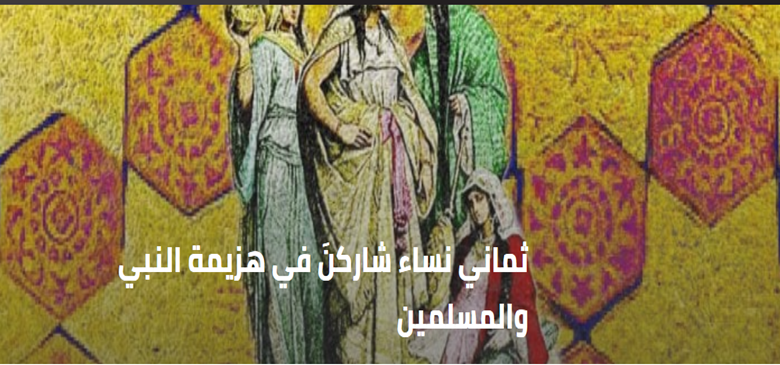
Historians mention that the Muslims committed a number of mistakes in the Battle of Uhud, the first of which was the departure from Yathrib to fight the "polytheists of Quraysh" instead of fortifying the city and waiting for them there, and the second was the violation of the archers who took their positions on the mountain to the Prophet's order not to leave their places.
The reason for the archers' violation of what was asked of them was their greed for the spoils that seemed to them close to their hands, after the defeat and flight of the Muslim opponents at the beginning of the battle. And those spoils were only women, women who are not like any women, but they are the blessed families of Quraysh who came to the field to ensure the men's desperation in the fight.
In a report that Al-Bukhari included, on the authority of Al-Bara bin Malik (d. 641 AD): “We met the polytheists on that day, and the Prophet, may God’s prayers and peace be upon him, seated an army of archers and commanded Abdullah over them and said, “Do not leave. When we met them, they (the Quraishites) fled until I saw the women swarming in the mountain.
And in a report on the authority of Ibn Abbas (d. 687 AD), narrated by al-Tabari in his “History”, that when the Muslims excelled in the battle over the Quraishites, “he said (the archers) who were behind them, one for the other, and they saw the women ascending (fleeing) up the mountain, And they saw the spoils: they went to the Messenger of God, and they caught up with the booty before they preceded us to it.
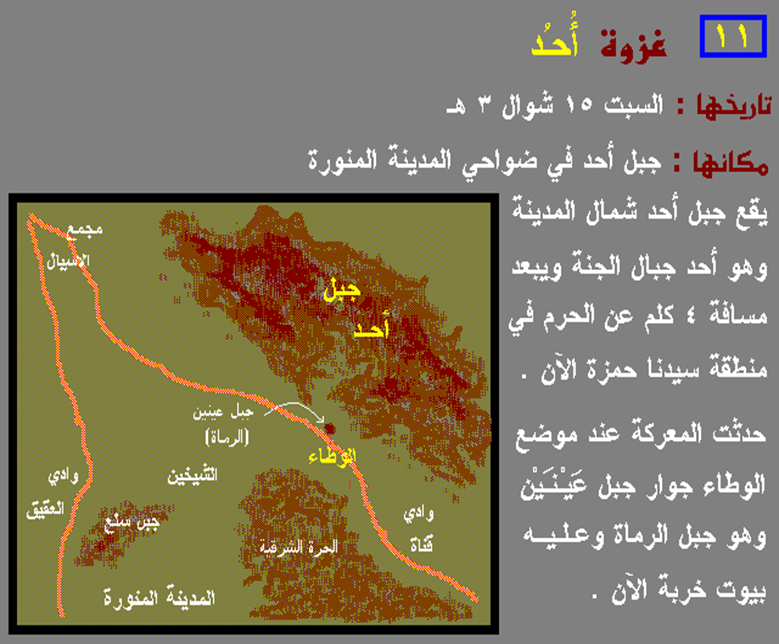
And in a hadith on the authority of Al-Zubayr Ibn Al-Awwam (d. 656 AD) that Ibn Ishaq mentioned in “Al-Sira Al-Nabawiyyah”: “By God, you saw me looking at the servants of Hind bint Utbah and her companions, with their headscarves, without taking them little or much, as the archers tended to the military when we exposed the people They wanted to loot from him, and they left our backs to the horses, so we came from our backs and a shriek shouted: “Muhammad has been killed, so we retreated and the people retreated against us.”
The result was that the Quraishites took revenge for their defeat in the Battle of Badr, and the defeat of the Muslims had a very severe impact on their souls, as seventy men were killed while their opponents killed 22, and the Prophet was severely injured in the battle, which is mentioned in a hadith narrated by Muslim: “The four (tooth) of the Messenger of God was broken, He was slashed, so the blood ran down his face, and he started wiping the blood off his face, saying: How can a people succeed who smeared the face of their Prophet with blood while he was calling them to God? Then God revealed: {ليس لك من الأمر شيء} (آل عمران: 128)".
Al-Tabari named in his history eight women from the Quraysh who went out with the men in the Battle of Uhud, and they are: Hind bint Utbah, Umm Hakim bint Al-Harith, Fatimah bint Al-Walid, Barzah (or Bara) bint Masoud, Rita bint Munabbah, Sulafa bint Saad, Khunas bint Malik ( Other sources call her Umm Khunas), and Amra bint Alqamah. Historical sources mention that the number of women was more than that.
These women played a major role in motivating men to remain steadfast and not back down before Muslims. Each of them has a story on the battlefield, some exciting and some painful.
Hind bint Utbah
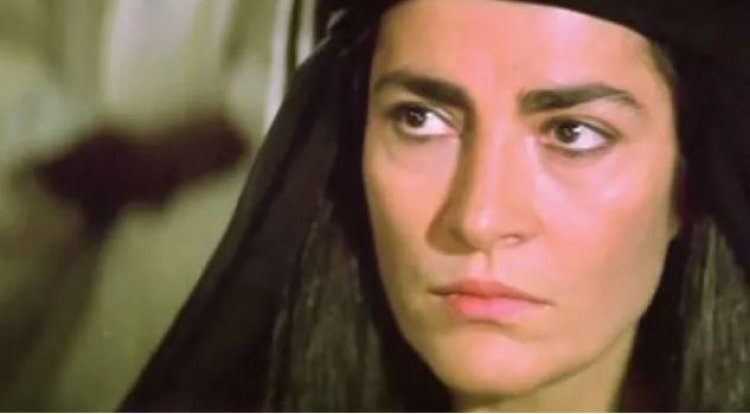
She is Hind, the daughter of Utbah bin Rabi`ah bin Abd Shams, from the Quraish tribe. Her father was Utbah bin Rabia, and her husband, Abu Sufyan bin Harb, was one of the chiefs of Quraish. She was the mother of the Umayyad caliph, Muawiyah bin Abi Sufyan, and she was one of the famous Arab poets before and after Islam.
There was a bitter revenge between Hind and the Muslims, caused by the killing of her father, Utbah, her uncle, Shaybah, and her brother, Alwaleed, in the Battle of Badr. Abu Al-Faraj Al-Isfahani narrates in his encyclopedia "Al-Aghani" on the authority of the historian Al-Waqadi the news of Hind's meeting with the famous elegiac poet Al-Khansa and her sympathy for her misfortune.
He said: “When Hind was afflicted with what she was afflicted with, and it reached her, she said: I am a greater calamity than Al-Khansa, and she ordered her howdah to be drawn with a flag, and she witnessed the season at Ukaz, and it was a market in which the Arabs gathered, so she said: Match my camel to the camel of Al-Khansa, so they did so. You, my brother? She said: I am Hind bint Utbah, the greatest calamity among the Arabs, and I have been informed that you are exalting the Arabs because of your calamity, so why do you exalt them? Al-Khansa said: Amr ibn al-Sharid, Sakhr and Muawiya, the two sons of Amr, and why do you exalt them? bin Rabia, and my brother Al-Waleed.
Among the poems Hind answered, she said:
I weep for the dean of both of them, and their protector from every aggressor who wants her
My father, the threshold of good deeds, and itch, so know / Shaybah, and the protector of Al-Dhamar is her son
Those are the family of glory from the family of the victor / and in glory from it when its number grows
Several narrations agree that Hind, when she saw the men of Quraysh embarking on battle at the beginning of the Battle of Uhud, sang a bold poem that enthused them with it: “We are the daughters of Tariq / We walk on camels / If they accept an embrace / Or they manage to part, / Separation without shame”, in which she threatens them with irony. Their women if they slacken and run away.
But Ibn Sayyid al-Nas, in his book "Uyoun al-Athar", quotes Ibn Ishaq that "poetry is not hers, but rather it is for Hind bint Bayada bin Tariq bin Rabah bin Tariq al-Ayadi. .
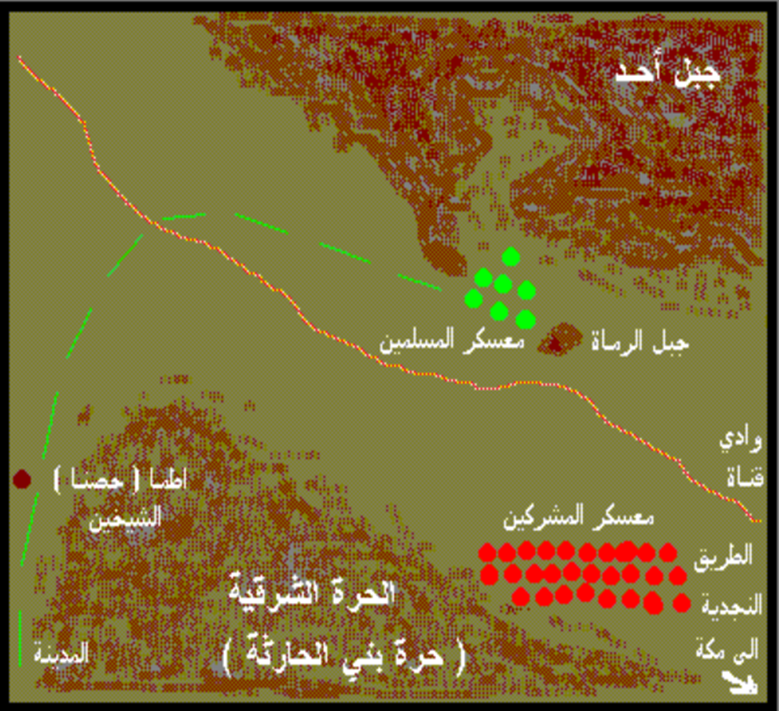
One of the reasons for the defeat of the Muslims in the Battle of Uhud was that the archers left their positions early, in pursuit of the "spoils", after the defeat and flight of the Muslim opponents at the beginning of the battle. And those spoils were only women, women who are not like any other women, but they are the blessed families of Quraysh
Hind may have sung an old poem that was not hers. But regardless of the aforementioned verses attributed to her, many narrations mention that she recited poetry on the day of Uhud. Al-Tabari reports in his "Tarikh" on the authority of Ibn Ishaq that Hind sang from her poetry after the end of the fighting, and that Umar ibn al-Khattab heard her poetry and recited it to the poet of the Prophet Hassan ibn Thabit, and asked him to respond to it and satirize it.
Amra bint Alqamah
She is Amra bint Alqamah, from Bani Al-Harith of the Kinana tribe, and they were allies of the Quraish. Al-Tabari does not mention the name of the fighter with whom Amra went out to battle, or if she went out alone. Although little is known about her in the sources, but she was the woman who played a decisive role in the fighting that changed the course of the battle, when she raised the banner of Quraysh after its fall, according to what Ibn Ishaq mentioned: “The flag was still dead until Amra bint Alqamah al-Harithiya took it, so I raised it to Quraysh, So they met him (gathered around him)."
This basic combat role for which Umrah deserved the praise of the poet of the Prophet Hassan bin Thabit, saying:
Had it not been for the Harthiya Brigade, they would have become/sold in the markets as djellabs
Khanas bint Malik

She is Khunas bint Malik, according to the history of al-Tabari and the biography of Ibn Ishaq, and Umm Khunas and Fatima al-Amiriyya, according to other sources. She is from the Kinana tribe, and she went out to the Battle of Uhud, accompanied by her son, Abu Aziz Ibn Umair. Her other son, Musab bin Omair, was on the opposite side, carrying the Muhajireen Banner, and he was killed in the battle after he held on to the banner until his hands were cut off and he was stabbed in the chest, and he fell.
Several narrations agree that Hind bint Utbah, when she saw the Quraysh men approaching to fight at the beginning of the Battle of Uhud, sang a bold poem that enthused them with it, and in it she threatened them to leave their wives if they slackened and fled.
The story of Khunas imprisoning her son Musab, when he converted to Islam, is well known, and when he did not back down, she left him alone and disavowed him. In his biography, Ibn Ishaq mentions a story that indicates the intensity of mutual stubbornness between Musab and his mother. The meaning of the story is that the Muslims captured Abu Aziz, the brother of Musab, in the Battle of Badr. And when Musab passed by his side, he said to his captor: “Tighten your hands with him, for his mother has possessions, so she may ransom him from you.” So I spoiled him with it.”
Later, Khunas converted to Islam to become one of the female companions.
Fatima bint Al-Walid
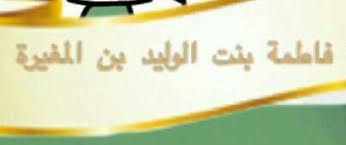
Among the participants in one of the events was Fatimah bint Al-Walid bin Al-Mughirah Al-Makhzoumiyyah, who is the sister of Khalid bin Al-Walid. She went out to the battle of Uhud with her husband, Sayyid Bani Makhzoum, Al-Harith bin Hisham bin Al-Mughira, and he is, as stated in the book “The Lion of the Forest in the Knowledge of the Companions,” the cousin of Khaled bin Al-Walid, and the cousin of Hantama, the mother of Umar bin Al-Khattab.
Before that, her two cousins, Amr ibn Hisham ibn al-Mughira ("Abu Jahl") and al-Aas ibn Hisham ibn al-Mughira were killed in Badr, and her brother al-Walid ibn al-Walid was taken prisoner.
Umm Hakim bint al-Harith

She is the daughter of Fatima bint Al-Walid. During the Battle of Uhud, she was the wife of Ikrimah Ibn Abi Jahl. And later, I converted to Islam on the day of the conquest of Mecca, and entrusted Ikrimah, who fled to Yemen, so the Prophet secured him, and I went out in his request and returned him until he became Muslim. After him, she married twice, the first for one day to Khalid bin Saeed, and the second to Umar bin Al-Khattab, to whom Fatima was born.
Umm Hakim is a woman whose courage history books tell. Ibn Saad narrates in “Al-Tabaqat Al-Kubra” that, during the caliphate of Umar bin Al-Khattab, she participated in the battle of Marj Al-Safar that took place between the Muslims led by Khalid bin Al-Walid and the Byzantines, and when her husband Khaled was killed, she went out and “Umm Hakim killed seven at that time at the pillar of Fustat in which Khaled bin spent the night Happy with her."
Sulafa bint Saad

Sulafa bint Saad Al-Ansariyya participated in Uhud, in which she witnessed the killing of her husband, Talha bin Abi Talha, from Bani Abd al-Dar, and her children from him: Musafa’, Al-Jallas and Kalab.
And it is narrated that she “vowed when (Asim bin Thabit) her two sons was injured on the day of Uhud: If she had the power to kill Asim, she would drink wine from his cranium,” according to Ibn Ishaq’s “The Prophet’s Biography.” And sulafa is also the mother of Othman bin Talha, who held the keys to the Kaaba. Al-Waqidi mentioned in “Al-Maghazi” that when the Prophet, on the day of the conquest of Mecca, sent Bilal (“the Abyssinian”) to ask him for the keys of the Kaaba, Othman asked his mother Sulafa for them, so they disputed with him for a long time, then she gave them to him.
Barzah bint Masoud cultural
She is the wife of Safwan ibn Umayyah al-Jamahi al-Qurashi al-Kinani, one of the chiefs of Quraysh. She is one of his six wives, and her departure with him, among his wives, to the Battle of Uhud indicates her courage and strength, especially since there is no mention of the killing of any of her family in the Battle of Badr, which means that she did not go out seeking revenge like others. She converted to Islam with her husband after the conquest of Mecca.
Rita bint Munbah

She went out to Uhud with her husband, Amr bin Al-Aas. Her father, Munabih ibn al-Hajjaj, was killed on the day of Badr, and her uncle, Nabih, and her brother, al-Aas ibn Munabih, were killed in the same battle. And an alert and a prophet among those whom Ibn Ishaq mentions among the two restaurants of pilgrims in Quraysh.
Her story is similar to that of Hind bint Utbah: she went out with her husband to Uhud to avenge her father, uncle and brother.
She is the mother of Abdullah bin Amr bin Al-Aas. I converted to Islam after the conquest of Mecca. And as the book “Al-Isaba fi Tamayoz al-Sahaba” says about it, it has a mention and has no narration.
Our past, as it is presented to us, is not events that occurred at a time that has passed, but rather it is a group of elements that have gathered from past times and are still alive and controlling our present and sometimes hinder us from looking forward to a different future. We constantly strive, as the largest independent media organization in the region, to break the cycle of ancestral domination and present our history and heritage with an eye that is not afraid to criticize fabricated narratives and "facts". Don't be just a regular visitor, get off the sidewalk with us, lead our journey of making a difference. Help us. Write your stories. Tell us what we're missing. Change, don't adapt!
Source: websites

